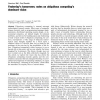118
Voted
PUC
2010
15 years 28 days ago
2010
Deploying UbiComp in real homes is central to realizing Weiserʼs grand vision of ʻinvisibleʼ computing. It is essential to moving design out of the lab and making it into an unr...
JUCS
2010
15 years 29 days ago
2010
: This article presents a rule–based agent mechanism as the kernel of a ubiquitous end–user, UI–independent programming system. The underlying goal of our work is to allow en...
131
Voted
IJLT
2010
15 years 1 months ago
2010
: Ubiquitous computing could help the organisation and the mediation of social interactions wherever and whenever these situations might occur. Using those technologies enables the...
130
Voted
HUC
2010
Springer
15 years 1 months ago
2010
Springer
This workshop promotes ubiquitous computing research in authentic urban setting, with real users and with sufficient scale and time span. We first motivate why such research is im...
116
click to vote
PUC
2007
15 years 2 months ago
2007
Ubiquitous computing is unusual amongst technological research arenas. Most areas of computer science research, such as programming language implementation, distributed operating s...
PUC
2007
15 years 2 months ago
2007
Many believe that ubiquitous computing will succeed when it has faded into the background of everyday life and work—that is, when it has become mundane. This paper examines the ...
115
click to vote
PUC
2007
15 years 2 months ago
2007
One of the tropes of the age of ubiquitous computing is the migration of computation into new spaces. Domestic environments have been a particular focus of attention for many. Howe...
121
Voted
PSYCHNOLOGY
2007
15 years 2 months ago
2007
Mobility is more and more mediated, supported and transformed by technological artefacts and infrastructures. Especially technologies labelled as mobile, pervasive, ubiquitous or ...
105
Voted
PUC
2002
15 years 2 months ago
2002
Abstract. We present the "Smart Playing Cards" application, a ubiquitous computing game that augments a classical card game with information
131
click to vote
MONET
2002
15 years 2 months ago
2002
The use of context in mobile devices is receiving increasing attention in mobile and ubiquitous computing research. In this article we consider how to augment mobile devices with a...

